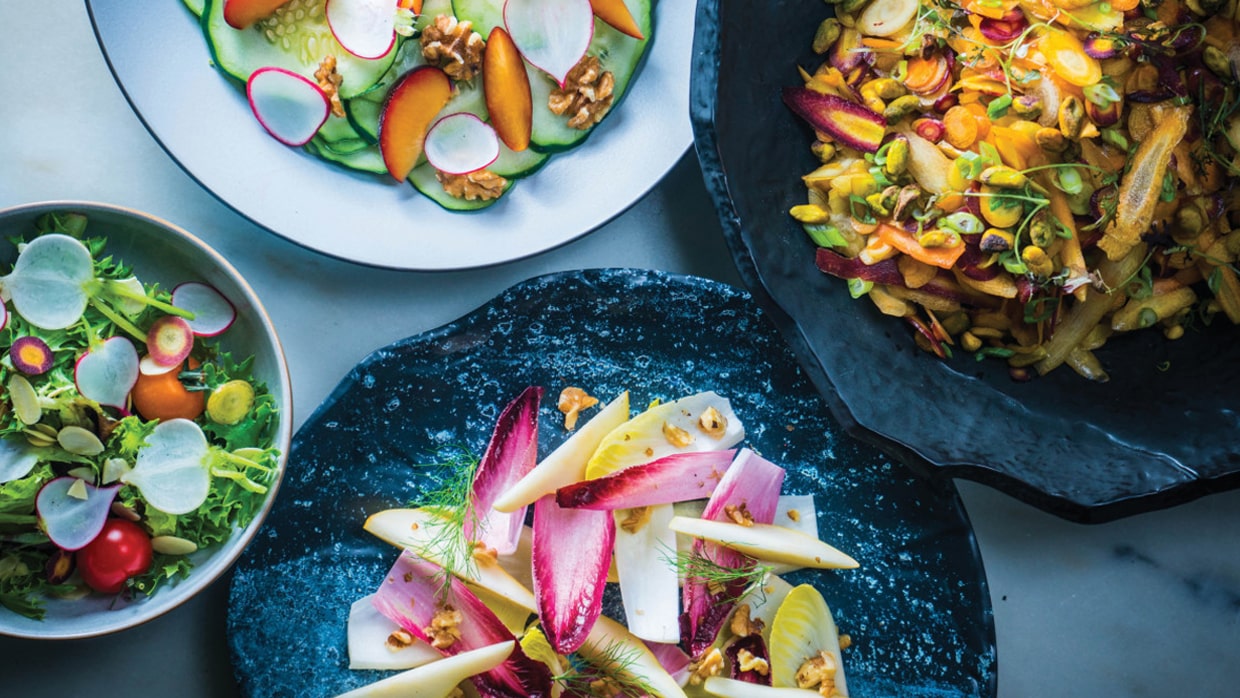How can chefs help tackle climate change?

One of the most important ways we can have a positive impact on the environment is through the food we buy and eat.
A chef can therefore lead positive changes in our eating habits through the meals they choose to cook and serve. This is a topic I am particularly passionate about, as it highlights the culinary expertise at the intersection of sustainability, seasonality, creativity and great taste.
Influential chefs around the world
Chefs have always been instrumental in passing on knowledge, adapting to change and implementing new menu items to adjust to what guests want to eat.
Today, chefs all over the world play a strong role in setting trends around sustainability and inspiring a new generation of chefs to think differently about the impact they can have, such as Rene Redzepi at Noma in Denmark. Noma has three Michelin stars and has been hailed consistently as one of the best restaurants in the world and was voted number 1 best restaurant for four years consecutively. Rene is completely focused on using only locally sourced, sustainable ingredients that are in season. He even forages for edible berries in the forests outside Copenhagen so that they can be incorporated into his recipe development.
The inspirational Dan Barber at Blue Hill Farm restaurant in New York is also at the forefront of the sustainable food and anti-food waste movement. Dan Barber educates other chefs about what is edible from the roots, the plants, the stems, flowers and seeds, as much of this knowledge has been lost in modern food production systems. Thinking about what you can do with a by-product and how it can be incorporated into the menu really opens your eyes to how we treat our food system.
And it’s not just the modern-day chefs, Michel Bras one of the most influential chefs of the world, has been focusing on the humble vegetable for decades, making them the stars of his menus. And of course, many other chefs over the centuries have shared their knowledge of what could be called good kitchen management. No chef likes to see food wasted, and it is a duty of all chefs to not only cook with passion but to educate on seasonality.
Sodexo chefs protecting the planet
As a foodservice provider employing thousands of chefs who serve 100 million guests worldwide each day, our chefs can have a direct impact on more sustainable food practices and ultimately more responsible meal choices around the world.
By ensuring our chefs are aware, engaged and fully trained in the issues at stake, we know they will bring passion and dedication to the meals they create. Some of the ways we foster this engagement include:
- Offering dedicated culinary training sessions about plant-based menus, sustainability and food waste reduction through our Global Chef Academy.
- Working with partners such as the Humane Society to develop specific training sessions about topics like vegan and vegetarian recipe development.
- Encouraging our chefs to try new cooking methods and be creative with their culinary skills to reduce food waste. This can be through new recipes, as well as new ways of thinking about food such as turning breadcrumbs in dessert prep or making chips out of carrot peels.
- Rolling out our worldwide WasteWatch program and its intelligent waste-measurement technology. The data from this program makes it easy for our chefs to implement changes needed to eliminate food waste produced by our kitchens or thrown out by our guests.
- Running specific initiatives which reduce food waste such as Full Circle in Canada. Full Circle focuses on three steps to reduce waste in the kitchen: Buy Local, Find Innovative Solutions, Use Everything.
Sodexo chefs leading the way
As a company we’ve set some ambitious sustainability goals and we are committed to cutting carbon emissions by 34% by 2025, a science-based target aligned with the most ambitious goal of the Paris Agreement to limit global warming to 1.5°C above pre-industrial levels. Our priority actions to reach this target include:
- reventing food waste: we will reduce food waste by 50% by 2025
- promoting plant-based meal options: 33% of our menus to be plant-based worldwide by 2025
- sourcing responsibly through local and short supply chains
Although challenges like these require commitments and actions from multiple stakeholders across the value chain, we are proud of the work our chefs are doing towards achieving these goals. Our chefs know how to creatively repurpose food that would otherwise be discarded, and they have key insights about plant-based menus and sustainability. These skills, together with data on how much food is being wasted, enable our chefs to make a real difference on the environmental impact of the meals we serve around the world. These are just some of the ways we’re working at Sodexo to drive change in our kitchens.
This piece is adapted from Lloyd’s participation at Bold Actions for Food as a Force for Good, the Pre-UN Food Systems Summit - Digital Meeting held on 23 November 2020.